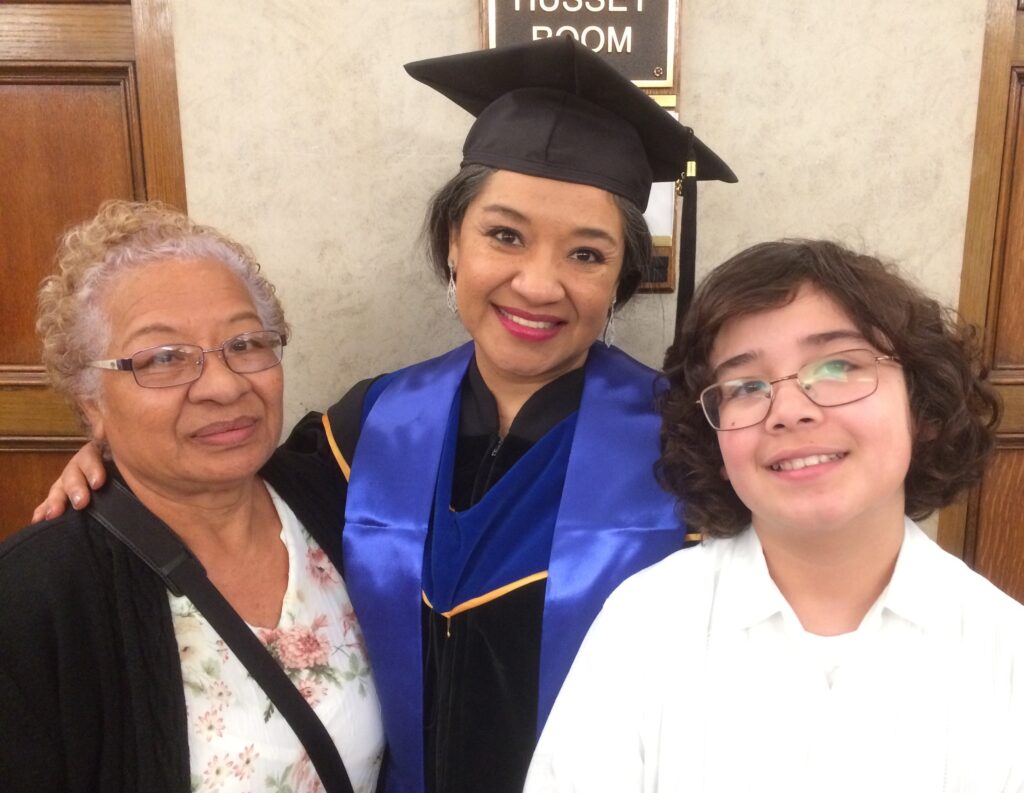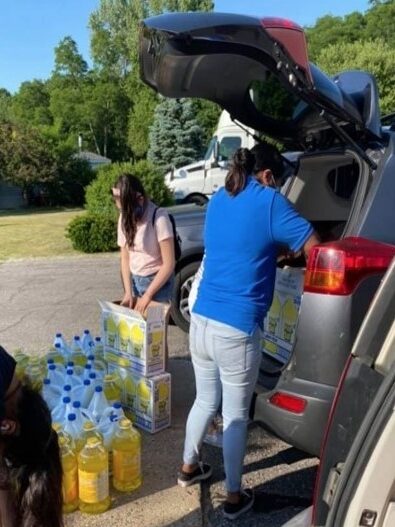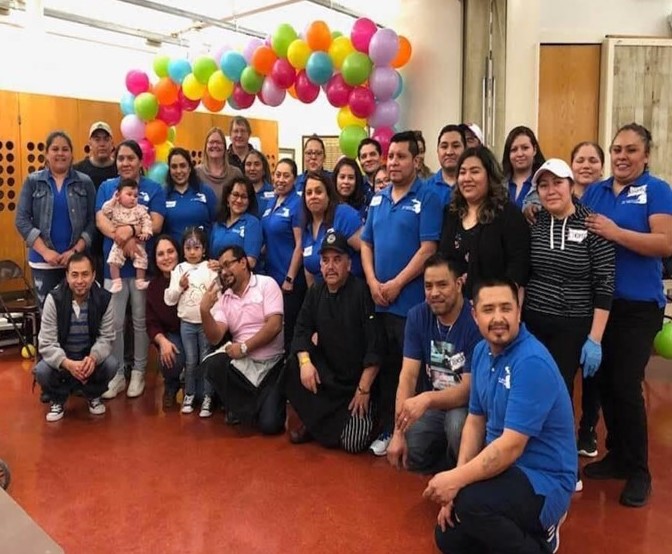Hispanic Heritage Month: Honoring María of Mexiquenses Unidos en Michigan
Published on October 6, 2023 in Basic NeedsCrisis Relief

Twenty-three years ago, María Militzer immigrated to Washtenaw County from Veracruz, Mexico. The veterinarian moved alongside many Mexican farmers whose livelihoods were uprooted by the North American Free Trade Agreement (NAFTA).
“At the end of 2000, the impact of NAFTA was very much felt on the small cattle farmers and competition was brutal,” María said. “They couldn’t compete, and they couldn’t survive. The investments from the government, if any, were very, very limited. The lack of technology, the lack of proper strategies to increase productivity, was devastating. Many of them decided to migrate just like I did. I followed them.”
When María first came to Washtenaw, she faced a rough adjustment in terms of economic sustainability and language barriers. It was a difficult period, but fortunately, María was able to attend English school by cleaning it in exchange for tuition costs. Early on, she recognized the lack of resources for immigrants in her position and she became very active in grassroots efforts that were helping Spanish-speaking individuals.
“I have been involved in different grassroots organizations since 2002,” María said. “Firstly, my husband and I published a bilingual newspaper that was distributed across Washtenaw County. From that effort, we became founding members of another organization, Latinos Unidos, and then became a part of another organization, Casa Latina. I was very familiar with the nonprofit environment.”
While working as a medical interpreter, María met the co-founders of Mexiquenses en Michigan, currently known as Mexiquenses Unidos en Michigan. The co-founders invited her to be a leader in the organization. Before accepting the offer, María completed her doctorate in public health, specializing on the impact of immigration on Latinx health. By late 2019, she was ready to accept the role of president at Mexiquenses Unidos en Michigan, just four months before the COVID-19 pandemic barreled through the community.
FILLING THE GAPS IN SPANISH-SPEAKING CARE



During the pandemic, the United States’ Latinx population disproportionately suffered job loss, food insecurity, and increased rates of COVID-19 infection, hospitalization and death. To better understand and meet the community’s needs, Mexiquenses Unidos en Michigan strengthened their close connections with Latinx communities and leaders in areas of Washtenaw with the highest rates of social and economic vulnerability.
Mexiquenses Unidos en Michigan began a fundraising strategy with the Washtenaw Interfaith Coalition for Immigrant Rights (WICIR) and the St. Francis of Assisi Church. The organizations garnered support through GoFundMe campaigns, donations from various churches and personal donations from the community. During the pandemic, the organization also received a grant from United Way.
“I was able to write a grant application to United Way, which was the very first funding organization that became aware of the importance of supporting low-income Latinx immigrant families in this pandemic,” María said. “Even when we didn’t know how brutal it would be, United Way created a very fast approach to distribute financial assistance to communities of color. I applied for that grant, received $15,000 and we distributed that in two or three days.”
María explained that many Spanish-speaking immigrants were not being helped by traditional pandemic supports. Both immigrants and Hispanic workers were among those most impacted by hazardous and difficult working conditions. Mexiquenses Unidos en Michigan was able to create a network distributing information and resources like personal protective equipment, cleaning supplies, food, diapers, formula, and more.
In the confusion, it was crucial to get translations of important health information into the Latinx community. By working with community members and leaders, 600 families were served by the organization during the pandemic. Today, more than 700 families count on Mexiquenses Unidos en Michigan for support.
“We are working to create the social space for Latinx immigrants in this county to be present, to be visible and to be self-sustained,” María said. “We are all volunteers. We are not an organization that has a building or an office or paid staff even. We do all this work because there is nothing else, nobody else that will come to the rescue.”
Mexiquenses Unidos en Michigan has come to the rescue in the fields of mental health and family reunification. They work to increase access to mental health resources through their Spanish Community Interpreter Project, which collaborates with providers and insurance institutions to better serve the Spanish-speaking community. Mexiquenses has also been reunifying families in their Esperanzas Viajeras “Traveling Hope” Project that assists older family members in Mexico to visit their relatives who are unable to travel because of their financial or immigration status.
SUPPORTING THE LARGEST MINORITY GROUP IN THE U.S.


Hispanic Heritage Month is celebrated each year from Sept. 15 to Oct. 15 to honor, recognize and celebrate the diverse community, culture and contributions of Hispanic people in the United States. Hispanic Americans have become the largest minority group in the nation with more than 63 million people. In Michigan, there are more than 500,000 people who identified as Hispanic in the 2020 census. These residents have a tremendous impact on the social and cultural enrichment of Michigan.
The Julian Samora Research Institute reported that Hispanic Americans are very active in the Michigan workforce, holding the highest labor force participation rate. The 2023 ALICE (Asset Limited, Income Constrained, Employed) Report found that an alarming 44% of Hispanic households were living below the ALICE Threshold, meaning these families could not afford to meet their basic needs.
Mexiquenses Unidos en Michigan has stepped up to fill the gaps in care by creating a network of support for Spanish-speakers. While we’re shining a light on María for addressing the needs of the Latinx community in Michigan, she said Mexiquenses members and volunteers are the real heroes. This month, María shared the stories of several local heroes and immigrants during a United Way’s “What’s the Word Wednesday” townhall event.
“Everyone contributes their own expertise and their own life experiences, because nobody else knows how all these factors and social conditions impact their lives better than themselves,” María said. “I think it’s the Mexiquenses members, and not me, who are the ones giving this organization a united front and I honor them this Hispanic Heritage Month.”
Visit https://latino.si.edu/hispanic-heritage-month to learn more about Hispanic Heritage Month.